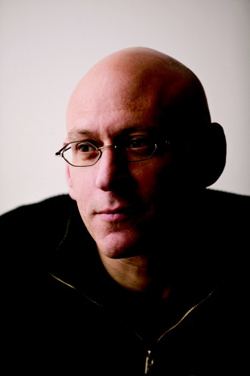David Shields recently appeared on The Bat Segundo Show #326. Mr. Shields is most recently the author of Reality Hunger.
Condition of Mr. Segundo: Settling for a quesadilla or some reality for lunch.
Author: David Shields
Subjects Discussed: The origins of the novel and the pretense of actuality, Shields’s dismissal of Myla Goldberg’s forthcoming novel based solely on a catalog description, the creative possibilities that emerge from mishearing, Sherman’s March, the mutability of text, Bloom’s The Anxiety of Influence, whether a truer creative impulse comes from misappropriation, common reality and the individual reception of a novel, Spenser’s “Mutability Cantos,” espousing work that is true to human consciousness, Shields’s view as the lyrical essay as the best opportunity for investigation, dreamworlds, Shields’s hatred of the exit door within the novel, Shields’s dismissal of Lolita as a “masturbatory book” that is “smug, so sure of itself,” laden with “purple prose” and “full of condescension,” Shields’s boredom with the “monuments,” Shields’s opinion on “formulaic” plot, the Ca’pn Crunch moment in Neal Stephenson’s Cryptonomicon, the Huey Lewis and Genesis chapters in American Psycho, Saul Bellow’s Herzog, Shields’s view of novel reading as a “childish” and “frivolous” activity, Vollmann’s The Royal Family, challenging Shields on the “fun” of reading, Sarah Waters, David Markson, Shields’s boredom with The Great Gatsby, a lengthy attempt to find a Lou Reed-related quote in the book, the value of the “hyperfake,” the Gormenghast books, China Mieville’s City and the City, Shields’s failure to maintain a “story gene,” Wittgenstein’s Mistress, Sebald, Rothko, quibbling with Shields’s definition of “a great artist,” David Foster Wallace and Tom Clancy, the meshing of high and low culture, Shields’s distaste for DFW’s fiction, Ulysses, “in no way is Infinite Jest a great novel,” Laura Miller’s review, the contradiction of Shields dissing a book without finishing it, and Shields liking Franzen’s The Corrections when sick and then getting over the flu and retrieving his brain to loathe it.
EXCERPT FROM SHOW:
 Correspondent: Let’s start with the beginning of the novel. I think that’s pretty appropriate. You write, “The origin point of the novel lies in its pretense of actuality.” You point to Defoe and Fielding’s efforts to suggest “real” accounts. But I’m wondering if any effort to offer a pretense of actuality in our present age, whether it’s through a remix or a collage, really represents an inevitable return to this antediluvian form. This pretense of actuality.
Correspondent: Let’s start with the beginning of the novel. I think that’s pretty appropriate. You write, “The origin point of the novel lies in its pretense of actuality.” You point to Defoe and Fielding’s efforts to suggest “real” accounts. But I’m wondering if any effort to offer a pretense of actuality in our present age, whether it’s through a remix or a collage, really represents an inevitable return to this antediluvian form. This pretense of actuality.
Shields: Exactly. I’m going to see if I can find this wonderful quote by Adam Gopnik in the book. And maybe you can help me find it. But he basically says that the only kind of — I’ve been trying to find it of late. Let me see if I can find it.
Correspondent: You didn’t memorize all 600? (laughs)
Shields: I’ve memorized most if them. But see if you can find the Gopnik. But anyway, there’s this incredible passage by Gopnik, who says that the only kind of work that can move us is work that is full of a kind of gallows humor and, above all, has an authentic disorder.* I think he’s talking about Francis Bacon. I’m not sure what. But I don’t know. Perhaps later, we’ll find it. But I think that’s right. That in a way, you’ve cut to the core of it. And Gopnik has. And I hope I have. Which is: any such gesture like, for instance, I must admit I was looking at the Knopf catalog. You know, I visited the Knopf office and they send you home with a catalog. That’s their big gift to you. And I’m looking at some of the books described. Various mainstream novels. And I’m just thinking, “You cannot be serious.” That in 2010, you’re publishing this book by this person. It seemed like such an unbelievably antebellum thing. I mean, it’s like, what does this possibly have to do with life lived at the ground right now? It just seemed absolutely preposterous. I just started bursting out in laughter.
Correspondent: Such as what exactly?
Shields: Well, the book that was being described — and no offense to her; I haven’t read her work — but it was a book by somebody named Myla Goldberg. Do I have her name right?
Correspondent: Yeah.
Shields: And, my god, talk about a formulaic text with these little plot points. (to waiter) Thanks a lot.
Waiter: You’re welcome.
Shields: You know, with these little plot points everywhere. (to waiter) Some more water when you have a moment?
Waiter: Sure, I’ll be back.
Shields: And it was just like, I don’t know what. You know, probably an intelligent, well-meaning, well-read writer. It’s like, “Wow!” This is so — you may as well be writing the most formulaic sitcom. And she’s a respected — and I think somewhat respected, somewhat commercially successful writer.
Correspondent: But you’re also…
Shields: And I was like — anyway, this is a longwinded answer of saying.
Correspondent: Yeah.
Shields: You’ve cut to it. Any such gesture now strikes me as antediluvian indeed. Absolutely.
Correspondent: But you’re also judging this not on the book, but on the description of the book. So therefore, we get into meta territory. So how can you make a judgment based off of a catalog description. If I did that, then I would probably avoid most books.
Shields: True.
Correspondent: Because they’re often written in this corporate copy.
Shields: Of course. But I’ve read enough of her other book. I’ve flipped pages to realize that catalog copy was all too relevant to the book. And also I love the line of Borges in the book, where he says something like, “Why write the book? Let’s just write the commentary of the book. The book can be summarized in ten sentences. Let’s write the meta commentary and cut to the point.” So the meta commentary interests me at least as much as the text itself. So in this case, it did not seem to be doing a disservice to the book.
Correspondent: Even though you haven’t actually flipped through the book.
Shields: Well, I’ve read her earlier — I’ve read in and around her earlier books. And it seemed the way — frankly, the way in which the book can be entirely summarized as a narrative machine — seemed to me a very, that very fact meant it was, by definition, for me, a dead text. I mean, there wasn’t a single thing discussed, but “this happened” and “that happened” and “this happened” and “that happened.” I mean, you might as well have had — it was just really embarrassing. It was embarrassing to read.
Correspondent: Embarrassing? You felt embarrassed?
Shields: I felt embarrassed that I was part — I mean, I think it was a Doubleday book. I was embarrassed that I was a publisher that had a relationship to that. I was like, “What does this have to do with the advancement of culture?” You know, nothing.
* — The specific passage Shields is trying to locate can be found in Paragraph 365, and reads: “It may be that nowadays in order to move us, abstract pictures need, if not humor, then at least some admission of their own absurdity — expressed in general awkwardness, or in an authentic disorder.” It’s taken from Gopnik’s “What Comes Naturally,” The New Yorker, July 20, 1992, pp. 66-69.
The Bat Segundo Show #326: David Shields (Download MP3)

This manifesto is literally Puritanical. Artifice and invention were seen as somehow Catholic to Defoe, who attributed the popularity of romances to “popery,” and the purpose of the whole found-manuscript trope was to give his fiction a more truthful sheen. A “lye” to Defoe meant something implausible, not necessarily something false. And good luck using Fielding, who wrote the most self-consciously artificial novel (Tom Jones) in the English language, to back up your ideas. I could see an equally persuasive manifesto calling for NO reality, for ALL artifice. It would be better than this return to the Puritanism of Defoe in 2010.
Oh dear. Anyone who talks about ‘the advancement of culture’ has lost me right there.
That said, any work of fiction which is nothing more than a narrative machine can be happily left to the machines. It might as well be computer-generated.
Ed,
Just wanted to say that this was one of the better interviews I’ve heard lately and that while some people view D. Shields as merely provocative and/or an instigator or a charlatan, I think it’s at least compelling to hear what he has to say about the possibilities for writing.
Even mere songs about Myla Goldberg are better than what this dude is doing:
http://www.youtube.com/watch?v=K6NuUJ7Pf9A
Hi Ed,
Love your show and your work, generally speaking. This is Stephen Tully Dierks, from Chicago. I regularly comment on HTMLGIANT and am otherwise “unknown.” Through the magic of online networking, I am the editor of a magazine called Pop Serial coming out in May, and featuring Tao Lin, Joshua Cohen, Brandon Scott Gorrell, Michelle Reale, et al., and visual artists from around the globe, including http://tessarlo.com, http://sonmisonmi.com, http://mgubia.com, and http://sarah-meadows.com. Full list is here, updated regularly: http://popserial.tumblr.com/post/461833926/pop-serial-a-limited-edition-art-literature-magazine
It is free for all involved; I’m paying for it. I’d like to mail you a copy. Actually two copies, because I’d like you to, if possible, give one to David Shields, “controversial” author of Reality Hunger. I have written a ~30 page piece, or would-be “novel excerpt,” of my own for the magazine entitled “Some Trembling Melody,” and I believe, quite immodestly, that it is, amongst other things, arguably a “response to,” “fulfilment of some of the ideas” of Reality Hunger. So yeah, if it can get to David, that’d be exciting. It is a fiction/essay/memoir hybrid with quotations, appropriations, or “sampling,” as I call it in the piece, and nods to Joyce, Beckett, Oscar Wilde, Lil Wayne, Tao Lin, Joshua Cohen, my beloved Salinger, amongst others…. It is constantly engaged in the quixotic quest for wisdom.
OK, have a good day, hope to hear from you,
Sincerely,
Stephen
http://popserial.tumblr.com